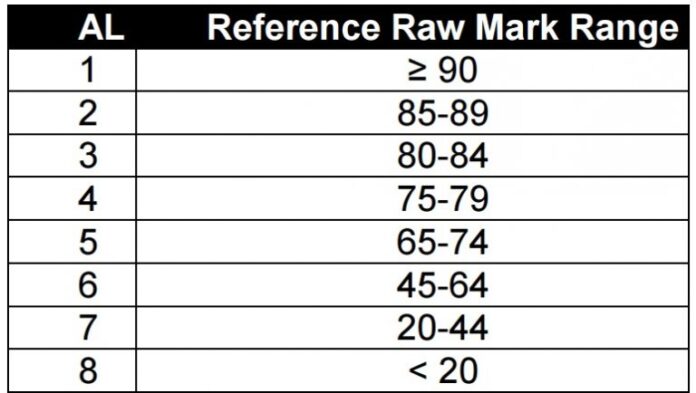The Primary School Leaving Examination (PSLE) Achievement Level (AL) score is a critical metric in Singapore’s education system, assessing the academic performance of students completing primary school. It encompasses four key subjects: English Language, Mother Tongue (Chinese/Malay/Tamil), Mathematics, and Science. Each subject is graded on a scale from AL1 to AL8, with AL1 representing the highest level of mastery and AL8 indicating the lowest acceptable performance.
Understanding the AL Scale
The AL scale provides a structured framework to evaluate students’ understanding and application of subject-specific knowledge. AL1 denotes exceptional proficiency, reflecting thorough comprehension and ability to apply concepts effectively. Conversely, AL8 suggests foundational understanding but with room for improvement in grasping essential concepts.
Calculation of PSLE AL Score
The PSLE AL score aggregates individual subject scores, resulting in a cumulative score that ranges from 4 to 32. This cumulative score is pivotal as it determines the secondary school placement for each student. Higher scores typically qualify students for more academically rigorous programs, while lower scores may lead to placements in less demanding educational tracks.
Importance in Singapore’s Education System
The significance of the PSLE AL score lies in its role as a determinant for secondary school placement and future academic pathways. It influences not only immediate educational opportunities but also long-term career prospects by shaping the trajectory of a student’s academic journey.
Grading System and Interpretation
AL Grades and Mark Ranges
Each AL grade corresponds to a specific range of marks within the subject. For example:
- AL1 typically encompasses the highest marks, indicating a near-perfect performance.
- AL2 to AL4 represent progressively lower but still strong performances.
- AL5 to AL6 indicate satisfactory understanding with room for improvement.
- AL7 to AL8 reflect foundational understanding requiring significant improvement.
Understanding these ranges helps stakeholders interpret students’ strengths and areas needing development, facilitating targeted educational interventions and support.
Cumulative Score Determination
The cumulative PSLE AL score results from summing up individual subject AL scores. This score provides a holistic view of a student’s overall academic performance across multiple disciplines. It serves as a benchmark for comparing students’ achievements and determining their readiness for different educational tracks in secondary school.
Significance for Secondary School Placement
The PSLE AL score directly influences secondary school placement, categorizing students into Special, Express, Normal (Academic), or Normal (Technical) streams. This placement not only reflects academic abilities but also impacts students’ access to diverse learning opportunities and future career paths.
Importance of PSLE AL Score
Academic Pathway Determination
The PSLE AL score plays a pivotal role in shaping students’ educational trajectories beyond primary school. It determines the type of secondary school program they qualify for, influencing the rigor of curriculum, pace of learning, and eventual academic achievements.
Impact on Educational Opportunities
Students with higher PSLE AL scores often gain entry into more academically demanding programs, providing them with enriched learning experiences and broader opportunities for academic and personal growth. Conversely, lower scores may necessitate additional support and resources to ensure students can meet educational standards effectively.
Long-Term Educational and Career Outcomes
The PSLE AL score serves as a foundational indicator of academic potential, influencing future educational decisions such as subject selection, examination pathways (e.g., O-Level, A-Level), and ultimately, career choices. It underscores the importance of early academic success in shaping long-term professional aspirations and achievements.
Factors Influencing PSLE AL Score
Preparation and Study Habits
Effective preparation strategies, such as structured study schedules, active revision techniques, and consistent practice, play a crucial role in improving PSLE AL scores. Students who adopt disciplined study habits and utilize resources effectively are more likely to demonstrate higher levels of academic proficiency across subjects.
Support System
A supportive environment comprising teachers, parents, peers, and educational resources significantly impacts students’ academic performance. Encouragement, guidance, and access to supplementary learning materials enhance students’ comprehension and retention of subject matter, thereby contributing to improved PSLE AL scores.
Psychological and Emotional Well-being
Students’ psychological and emotional well-being can influence their ability to concentrate, manage stress, and perform optimally during examinations. Strategies promoting mental resilience, stress management techniques, and a positive mindset are essential in maximizing students’ potential and enhancing their PSLE AL scores.
Strategies to Improve PSLE AL Score
Structured Study Plan
Developing a structured study plan tailored to individual learning needs and subject requirements is essential for effective exam preparation. This plan should include designated study times, realistic goals, and targeted revision sessions to reinforce understanding and retention of key concepts.
Practice and Mock Exams
Regular practice tests and mock examinations simulate real exam conditions, allowing students to familiarize themselves with question formats, manage time efficiently, and identify areas requiring further improvement. Analyzing performance feedback from mock exams enables targeted revision and enhancement of exam-taking strategies.
Seeking Additional Support
Utilizing educational resources such as tuition classes, online learning platforms, and consultations with subject teachers provides students with supplementary guidance and clarification on challenging topics. Proactive engagement with support networks enhances comprehension, boosts confidence, and contributes to overall academic success.
Conclusion
PSLE AL score serves as a fundamental benchmark in Singapore’s education system, evaluating students’ academic proficiency and determining their secondary school placement. Understanding its grading system, significance, and factors influencing scores is crucial for stakeholders seeking to support students’ educational journeys effectively. By fostering a supportive learning environment, implementing effective study strategies, and utilizing available resources, students can optimize their PSLE AL scores and achieve their academic aspirations.
This comprehensive guide aims to empower parents, educators, and students with actionable insights and strategies to navigate the complexities of the PSLE AL score effectively. As Singapore continues to prioritize educational excellence and student achievement, the PSLE AL score remains instrumental in shaping the future generation’s academic success and overall development.
